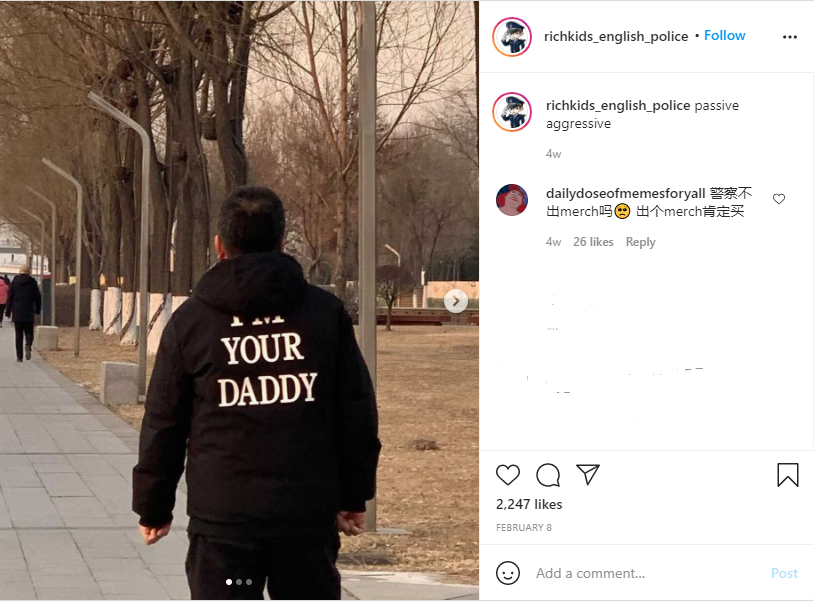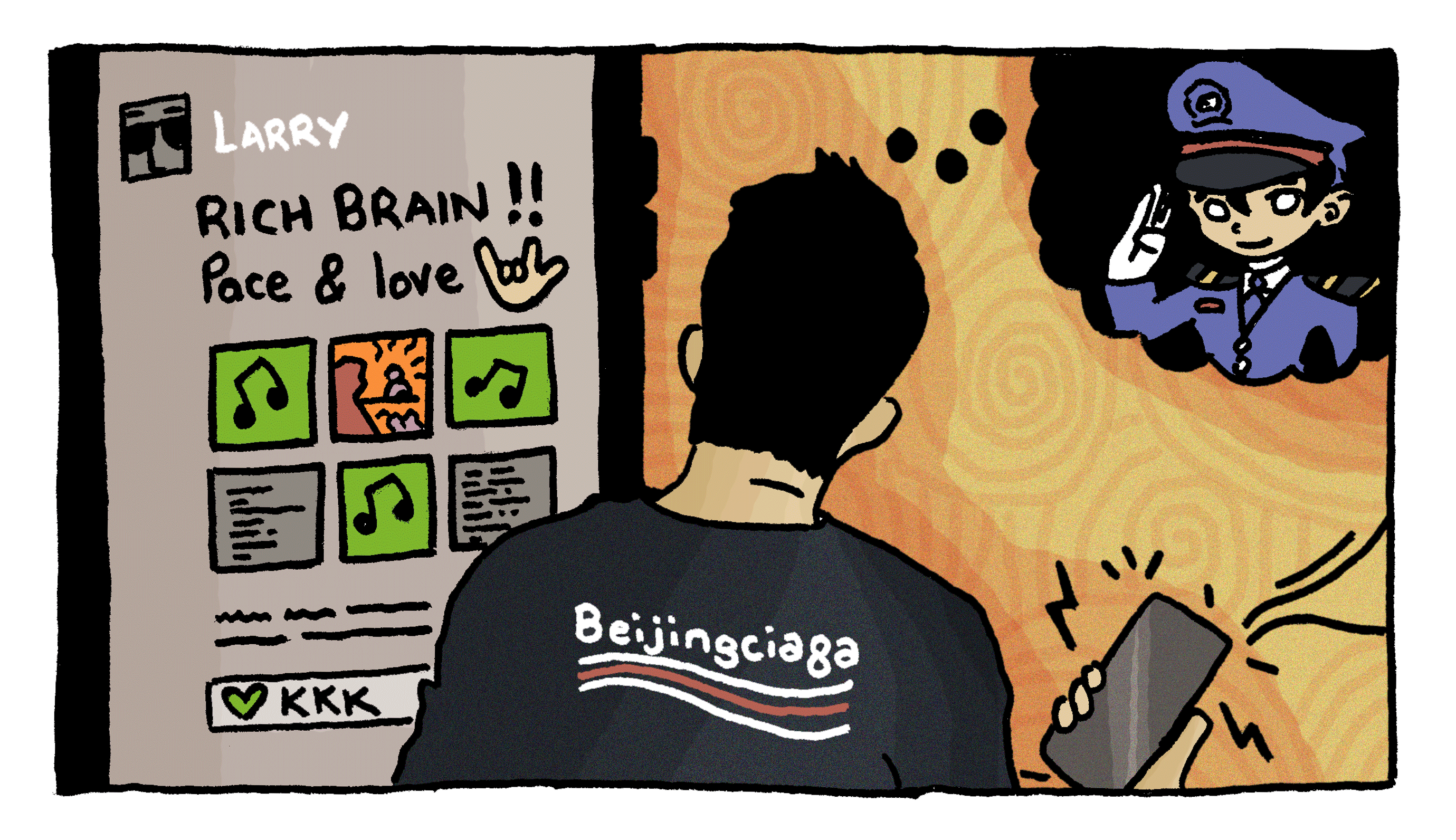This dispatch appeared in S01 Episode 1, along with China’s First Listeners by Caiwei Chen.
Tianyu: @richkids_english_police started as a private meme stash in late 2016.
The Nanjing native Xiao Hong—not his real name—was a history student in the United States when he opened the popular Instagram page that now has 163,000 followers. It is dedicated to exposing funny, awkward English (or Chinglish) mistranslations. If you’ve never heard of it, here’s what their posts look like:



“My friends at New York University often showed me the social media pages of their friends, who were international students living lives of debauchery,” Xiao Hong tells me. “These posts often included pretentious photos combined with [grammatically incorrect or mistranslated] English text.” One July 2017 post is a screenshot of an Instagram update. A late-night selfie, face lit by a smartphone screen. Caption reads: “I was courting sheep all night.”
Xiao Hong would sometimes joke about these posts (mostly from WeChat Moments and Instagram) in private, but eventually he’d collected so many of them that he could post daily for years.

Krish: The classic “dank stash” to “based page” pipeline.
Yi-Ling: Reminds me of “Versailles Literature” (凡尔赛文学) - the rise of the online flex and humblebrag—and richkids_english_police is the Robespierre out to axe all the Marie Antoinettes of rich Chinese students.
Tianyu: Instagram was the perfect place for it. In the U.S., teenage Instagrammers have made reposting memes a profitable industry, though Instagram has been trying to take them down.
You have to be literate in both Chinese- and English-language internet cultures to understand the humor of @richkids_english_police. Instagram is blocked in the People’s Republic, so its Chinese user base is mostly bilingual, bicultural youths living overseas. “Chinese people who are not familiar with foreign contexts may not get what is so awkward about these people’s imitations,” Xiao Hong says.

In the early days, he gained fame on Weibo, where influencers shared screenshots of his posts—which in turn boosted his follower count from a few thousand to 50,000. Its content is crowdsourced: tag the handle for a repost, or just slide quietly into their DMs. Though some of his content originally comes from Chinese social media platforms, many are (crowdsourced) “originals” which get shared back to Weibo or Douban as screenshots.
Other Chinese meme accounts emerged during the pandemic. There’s @dongbeicantbefuckedwith (31.9k followers), which (among other things) jokes about northeastern Chinese culture (hence the dongbei in the handle; it’s where you’d find the hometown of the owner, a film student in the U.S.).
Krish: Also Tianyu’s hometown, fyi.
Tianyu: It’s true. I, too, cannot be fucked with.

Yi-Ling: To add to the stereotype: Dongbei is also the center of tu (土)—an aesthetic of tacky, rustic excess. The runt of Chinese provinces, in contrast to its booming southern siblings. The "Rust Belt" of China. People are characterized as loud, uncouth and wonderfully, refreshingly frank. (Source: my Dongbei father.)

Tianyu: Inspired by @richkids_english_police and @dongbeicantbefuckedwith, W, a college student in the U.S., started @dailydoseofmemesforyall (11.5k followers) sometime between March and April of 2020. At first, W casually shared memes she found elsewhere and wasn’t expecting many followers.

Those followers, mostly Chinese expatriates, began to message W to share stories—some happy, others tragic. W tells me that some followers took her account as a shudong (树洞) or “tree hollow,” referring to Weibo accounts where depressed Chinese youths whisper secrets to the warm digital embrace of strangers. “Many people would DM me, telling me I’m their source of happiness,” W says. It motivated her to continue maintaining the page.

Xiao Hong also uses Instagram’s Q&A function, inviting followers to share their stories. One couldn’t get a ticket home on the passing of a family member in China during the pandemic; another had to break up with their partner living in a different country. Many talked about racial violence they’ve experienced in the West and the homesickness of living abroad.
In a way, the walls of this space—built out of alienation abroad and censorship at home—have fostered a safe environment for a community of young, globalized Chinese. But I couldn’t help but notice that, while satirizing super-rich fu’erdai showing off their extravagant, kitsch lives in Manhattan’s high rises, these bicultural meme pages on Instagram at times deride those without a Western education or middle-class comfort. Among those featured (and mocked) are assembly line workers in Guangdong wearing shanzhai Louis Vuitton shirts, migrant workers in the service industry blundering English pronunciations, and others struggling to survive the cruelties of China’s globalization.

Tianyu: I’m often amused by the cringeworthy Tinder profiles, machine-translation failures, and political satire, but I cannot deny my sense of discomfort at some of the content. These meme pages also poke fun at videos on Chinese platforms—the wanghong wannabes from underprivileged backgrounds, English teachers with an accent, or tu (earthy) Kuaishou skits that many in China actually enjoy, appreciate, and relate to.
Many of the people I grew up with never had the resources to become fluent in another language or culture, and when I first moved to America I struggled with the language, too. The occasional elitism and condescension towards “underclass” cultures—and the casual appropriation thereof—have made the titters less charitable.
Rural or urban, migrant or local, “earthy” or international; subcultures, at the end of the day, emerge from these deepening chasms of contemporary China, the ever increasing divides between Kuaishou and Instagram.
Krish: I resonate so much with this “discomfort” because I’m reminded of r/IndianPeopleFacebook (one of the engines that drove the viral “friendship ended” meme), which I obsessed over when it was first popular, then distressed over once its form settled into consistent class-shaming and punch-down humour. I think a lot about what kind of subculture can emerge from this genre of ironic absurdism, and India’s recent history of meme pages offers a dark answer: only extremist, voyeuristic, fractured ones.
Caiwei: There is a fine line between revealing the absurdity of unnecessary English use in everyday Chinese life and perpetuating a hegemony where being able to discern the “right way” to use English gets people on their high horse (#NormalizeChinglish). There’s just something tragic about the constant cringe-worthy misuse of English on the Chinese web: people still feel like only English “counts” in so many situations, leading to the language being reduced while falsely inflated at the same time.
Henry: If things go the same way as Japanese, Chinglish terms could “assimilate” and become pseudo-anglicisms, which are perfectly acceptable/standard, though unintelligible to anglophones.
Krish: It’s interesting to think of these meme pages as a kind of pre-emptive “gentrification” of China Instagram. There was a similar dynamic with the shamate subculture in southern China. These were migrant workers that found solace from their brutal work life by adopting elaborate, colorful hair styles. They were mercilessly mocked … muscled out of their social media havens by urban elites sneering at their styles, making them objects of scorn and parody.
Yan: To build on Krish’s shamate example, when @richkids_english_police makes punch-down jokes, they are not too different from the live-streamers who picked on shamate styles purely for clicks and profit on Kuaishou. The difference here is that the people being mocked cannot even see it.
Tianyu Fang is a writer who grew up in Beijing. He spends most of his free time eating Lanzhou beef noodles and subtweeting.
Krish Raghav is a comic-book artist in Beijing. He was once the mod for a big Final Fantasy VII forum. He has never played Final Fantasy VII.
Yi-Ling Liu is a writer in Beijing. She likes to wall-dance—both online and at the climbing gym.
Caiwei Chen is a writer, journalist and podcaster. She cooks with boxed ingredients but tries to finish all her dishes with a gourmet touch.
Henry Zhang is a writer and translator in Beijing.
Yan Cong is a Beijing-based photographer. She is not the guy in Jilin who carries a rock on his head, despite Google’s insistence.

